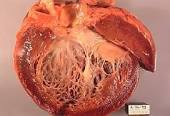
Diagnosed with Cancer? Your two greatest challenges are understanding cancer and understanding possible side effects from chemo and radiation. Knowledge is Power!
Learn about conventional, complementary, and integrative therapies.
Dealing with treatment side effects? Learn about evidence-based therapies to alleviate your symptoms.
Click the orange button to the right to learn more.
- You are here:
- Home »
- Blog »
- side effects ID and prevention »
- Cardio-toxicity Kills… Is It Treatable?
Cardio-toxicity Kills… Is It Treatable?

(Chemotherapy regimens that cause) most commonly reported CV toxicities, including cardiomyopathy/heart failure and myocarditis, vascular toxicity, and hypertension, as well as arrhythmias and QTc prolongation…
According to the article linked below there are now dozens of different chemotherapy regimens that are cause cardio-toxicity, are cardio-toxic and can damage the patient’s heart.
Remember that these cardio-toxic therapies have been researched and approved as “safe and effective” by the FDA.
Annual echocardiograms have indicated that I have developed each type of heart damage including:
- cardiomyopathy/heart failure and myocarditis,
- vascular toxicity, and
- hypertension,
- as well as arrhythmias
The Real Problem
According to research, conventional oncology can’t or won’t study side effects for more than 5 or 10 years. According to research, long-term research is just too heavy a lift- it’s just too darn expensive!
I documented this in my blog post
Long-term, Late Stage Side Effects “Not Worth Tracking-” Oncology
When your oncologist quotes you a time frame or your risks of a side effect occurring, such as cardiomyopathy, myocarditis, arrhythmia, please understand that conventional oncology has a limited or short-term understanding of possible heart damage caused by all forms of chemotherapy.
He/she just doesn’t know either the odds or the time frame of the side effect occurring. Conventional oncology talks about the risk of heart damage being 10 or 20% of patients. I call BS on this risk estimate.
That percentage may be accurate for a single chemo regimen, a single drug. But if you, like me, underwent multiple regimens over a period of months or years, the risk will surely multiply. Induction therapy combined with my autologous stem cell transplant included:
- anthracycline/Doxorubicin
- Cytoxan/Cyclophophomide
- Busulfan
- Melphalan
It is surprising to me that it took 15 years for my chronic Afib and cardiomyopathy to develop. Just my thinking of course, but I think most cancer survivors will develop heart damage if they live long enough.
The Solution?
Evidence-based but non-toxic, non-conventional therapies. For your heart health, in this case. You’ve been reading about the heart benefit of frequent, moderate exercise for so long you’ve probably tuned it out by now. You may have heard about the heart-healthy benefits of a Mediterranean Diet before too.
Health health supplementation- CoQ10, Curcumin, Omega-3 fatty acids, and on and on…
Lifestyle therapies such as whole body hyperthermia-
I began researching and trying evidence-based non-conventional therapies after my diagnosis of chemotherapy-induced cardiomyopathy in late 2010. Based on the past five years of echocardiograms, I have stabilized and am beginning to health all of the problems caused by cardio-toxic chemo undergone in 1995.
I have linked the study documenting cancer therapies and cardio toxicity to make cancer survivors aware of their heart damage. I encourage you to read the study below and try to understand how prevalent heart damage due to chemo treatments really is.
I don’t want this post to come across as if it is either conventional heart medications such as ACE inhibitors, Beta Blockers, etc. or non-conventional therapies such as exercise, diet, supplementation, etc.
If fact, a complementary approach to your heart health is probably something for you to consider. I would talk to your cardiologist or perhaps your onco-cardiologist.
If you have any questions or comments, scroll down the page and send me a question or comment. I will reply to you ASAP.
Thank you,
David Emerson
- Cancer Survivor
- Cancer Coach
- Director PeopleBeatingCancer
Recommended Reading-
PeopleBeatingCancer- Side Effects Program
Defining cardiovascular toxicities of cancer therapies: an International Cardio-Oncology Society (IC-OS) consensus statement
“This document addresses these issues and provides consensus definitions for the most commonly reported CV toxicities, including cardiomyopathy/heart failure and myocarditis, vascular toxicity, and hypertension, as well as arrhythmias and QTc prolongation…
What constitutes cardiac (or myocardial) dysfunction as a cardiovascular toxicity?Which cancer therapeutics are associated with cardiomyopathy and heart failure?
CTRCD has been described in association with many cancer therapies including:
- conventional chemotherapeutics (anthracyclines) and
- different classes of targeted therapies such as HER2-targeted agents,
- certain small molecule kinase inhibitors, and
- specific proteasome inhibitors.
The incidence and details of CTRCD associated with specific cancer therapeutics have been described extensively elsewhere.6–9 For the purposes of this document, a summary of agents, for which a direct causative association with CTRCD has been described in clinical trials, is presented in the Supplementary material online, Table S1…
- How is this definition of cancer therapy-related cardiac dysfunction different or improved?
- What defines symptomatic cancer therapy-related cardiac dysfunction?
- What defines asymptomatic cancer therapy-related cardiac dysfunction?
Myocarditis
What constitutes myocarditis as a cardiovascular toxicity?
Myocarditis is an inflammatory disease of heart muscle cells. In cancer patients, most commonly myocarditis can be seen as a result of direct toxicity or as an immune-mediated event.44
Which cancer therapies have been associated with myocarditis?
Traditional cytotoxic cancer therapies (e.g. doxorubicin, fluorouracil, and cyclophosphamide), radiation therapy, and ICIs have been associated with the development of myocarditis.6,45
Which myocarditis definitions have been used in cancer patients?
How is this definition of myocarditis different or improved?
What defines immune checkpoint inhibitor-mediated myocarditis?
Vascular toxicities
What constitutes vascular toxicity in the cancer patient?
Vascular toxicity is the induction or aggravation of vascular disease in the setting of cancer therapy.
Which cancer therapies have been associated with vascular toxicity?
This topic emerged with the introduction of 5-fluorouracil into cancer therapy regimens but has been noted with several other cancer drugs including:
- platinum drugs,
- cyclophosphamide,
- gemcitabine,
- bleomycin,
- vinca alkaloids,
- the immunomodulatory drugs interferon alpha 2B and lenalidomide,
- the proteasome inhibitor carfilzomib,
- and the mTOR inhibitor everolimus
(Supplementary material online, Table S4).61
Vascular toxicities gained further interest with the introduction of targeted therapies, namely vascular endothelial growth factor (VEGF) signalling pathway inhibitors (VSPI), breakpoint cluster region-abelson (BCR-Abl) tyrosine kinase inhibitors such as nilotinib and ponatinib, and the epidermal growth factor receptor inhibitor erlotinib.62,63 Last but not least, vascular toxicity can also be seen with radiation injury but does not emerge until sometime after completion of therapy.
Which vascular toxicity definitions have been used in cancer patients?
Myocarditis occurrence with cancer immunotherapy across indications in clinical trial and post-marketing data
“Taken together, the results from the ISS and the FDA FAERS/AERS databases highlight the need for prompt recognition, diagnosis, and management of myocarditis in patients receiving ICIs, with additional vigilance with ICIs combination therapies, from treatment initiation through several weeks after ICI discontinuation.
The monitoring and management of cardiac irAEs has been well described by Palaskas and Spallarosa; a diagnostic workup including the use of laboratory values (Troponin I, N-terminal pro B-type natriuretic (BNP) peptide, BNP), imaging (12-lead electrocardiogram, echocardiogram, cardiac magnetic resonance, telemetry monitoring), and procedures (endomyocardial biopsy and coronary angiography) is recommended in patients with suspected myocarditis55,66. While the diagnostic workup is performed, ICI therapy should be discontinued, and prompt initiation of corticosteroids (1000 mg intravenous (IV) methylprednisolone for three days followed by 1 mg/kg IV/oral prednisone) is recommended. If the diagnostic workup demonstrates definite, probable, or possible myocarditis, corticosteroids should be continued and tapered off over four to six weeks. Of particular importance is attention to the electrocardiographic changes that occur in myocarditis, such as arrythmias67,68,69 is the predominant mechanism of morbidity and mortality and close consultation with cardiology colleagues and in particular electrophysiology subspecialists is key in the multidisciplinary care of these patients.
In summary, we confirmed statistically significant association of ICI use with myocarditis using FARS/AERS data and stratified this association by specific cancer types and by ICI combination therapies. We found and an increased reporting of myocarditis cases for patients treated with ICI–ICI, ICI–axitinib, and ICI–chemotherapy combinations.”



